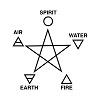The study of religion does not only comprise the different beliefs of people throughout history and the modern world but also the specific institutions and behaviours of people of faith. As an academic branch of study Religious Studies is secular-based when compared to Theology. However both are included in this category. A study of religion will include the historical consideration and often requires an understanding of the culture and anthropology of the area of study. Mythology and philosophy are closely aligned to Religious Studies.
Religious Studies compromises both Western and Eastern religions, atheism and agnosticism, and the comparison of religions as well as religions in the modern world. Some historical perspectives can be found here, and others in related History, Literature, and Art History categories.
The major issue in religious studies is the complication of objective study and subjective belief. There are two main ways to study religions: phenomenology and functionalism. Functionalism uses the functions of the specific religion to describe and analyse it, however it does not address social changes and conflicts¹. Phenomenology is a more methodic way to study a religion, by treating the different parts of the religion themselves without bias from the observer’s personal opinions.
References:
1. Subedi, D. Structural Functional Perspective in Sociology [PDF document]. Retrieved from : http://subedi.orgfree.com/docs/Structural_Functionalism.pdf
Title Image Credit: Wikimedia Commons
© BrainMass Inc. brainmass.com June 28, 2024, 3:03 pm ad1c9bdddf




